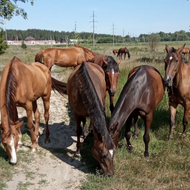
Wilderley is seeking funds to transport the horses to safer areas.
The owner of a Suffolk animal therapy farm is asking the equestrian community and animal lovers to donate to its fundraiser to evacuate injured and at-risk horses from Ukraine.
Celeste Goschen, who founded Wilderley, a sustainable living recreational farm, has taken in a refugee family from Ukraine, a woman named Masha and her daughter.
Wilderley and Masha are now working together to create connections between Ukrainian refugees and the South East of England.
A horse yard at the Kharkiv veterinary university in Ukraine has contacted Wilderley for assistance to rescue their 20 horses, which are at risk during the siege, but also are at risk of starvation and suffering with a lack of veterinary medications and support.
Celeste commented on the appeal: “At the moment, we have managed to raise immediate funds to help transport the horses to a safer place in Ukraine.
“But we urgently need further funding to cover the necessary vaccinations and passports, before the horses can be moved to the safety of the UK. Once there we will be calling for foster homes.”
Dergachev Children's and Youth Equestrian School of the Kharkiv's State Biotechnological University is coordinating the campaign alongside Wilderley, and the head groom there said: “We have managed to place some of the horses in temporary stables, but we need to get the rest out as soon as possible.
“The added problem is that while the owners of the temporary stables are kind people and could not refuse us, they cannot keep our horses for a long time, because they do not have enough food or space.
“We would like to transport some of the horses to other stables in the Poltava region, so that everyone has enough space and food. There is also a club with a sufficient stalls and feed for our horses, but there is already a problem in paying for their keep there.
“Thanks to a volunteer organization in Ukraine, as well as simply caring people, we have now been able to pay for a month's stay. Some athletes who train with us have paid for their favourite horses themselves.
“But the funds are rapidly running out, and within a month we will have a problem with paying for the stay. Unfortunately, we understand that this nightmare will not end in a month and we will not be able to return home so quickly.
“So far, we have no idea what to do next and really need support. Your help in any small part is a serious step for us and our horses, for which we will be eternally grateful.”
Wilderley's GoFundMe page for the appeal can be found here.
Images (C) Wilderley/Kharkiv's State Biotechnological University



 The veterinary mental health charity Vetlife is inviting the veterinary community to join it for a sponsored cold-water dip.
The veterinary mental health charity Vetlife is inviting the veterinary community to join it for a sponsored cold-water dip.